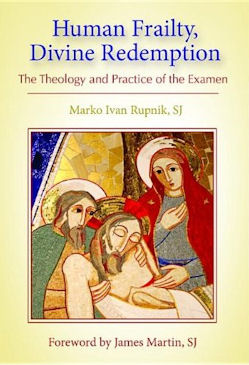
|
Posted May 2, 2012
Book: Human Frailty, Divine Redemption: The Theology and Practice of the Examen Author: Marko Ivan Rupnik, SJ Pauline Books and Media. Boston, MA. 2011. pp. 87 An Excerpt from the Jacket:
An Excerpt from the Book: Memory and the Examination of Conscience The woman who lost her coin and began to search for it with a lamp would never have found it if she had not remembered it. And when she found it, how could she have known whether it was hers if she had not remembered it? I remember having lost many things and having looked for and found them; and I know that when I was searching for any of them and was asked: "Is this it? Is that it?" I answered, "No," until what I was searching for was presented to me. But if I had not remembered it --- whatever it was --- I would not have found it, because I could not have recognized it, even if it had been shown to me. And this is the way it always is when one loses something, searches for it and finds it. If anything, for example, a visible object, disappears from our view, but not from our memory, its image is preserved within us, and so we look for it until we see it again. And when we find it, we recognize it thanks to the image we carry inside ourselves; we could not say that we have found the object if we do not recognize it. It was, in fact, gone from our sight, but still present in our memory. Augustine St. Augustine emphasizes the indispensable role of memory in the process of knowledge. Memory is based on experience. It is the dimension of our intellect that grounds awareness in experience. Through experience, our memory constantly connects our mind to life; it keeps our reflection, speculation, and reasoning attached to life. Life is communicated through interpersonal relationships --- even a child's birth depends on the communication between two persons, on their relationship. A person's life is founded on the relationships he or she establishes with other people, creation, self, and God. We live because the Creator enters into relationship with us, his creatures. This relationship is the living source that seals the mystery of life with love and the ability to relate and communicate. However, since relationships are exposed to sin and evil, it follows that the human memory cannot escape this fate. Once the memory has been disturbed or wounded, we cannot simply correct it by means of reasoning or self-understanding, as if we had the ability to determine its content. Since the memory is directly connected to life, it seems to act on two levels. On the one hand, it is completely human activity, because it originates from our intellect and is based on our experience. On the other hand, it is open to that boundless mystery to which life itself introduces us, because life constantly leads us to a threshold, a boundary from which it stretches out to us: life comes, visits, and is given to us; in a certain sense we possess and direct life, but our experience forces us to admit it is impossible to exercise dominion over it. And what we can't dominate in life, what leads us to intuit this openness, is precisely the mystery of free relationships, of love --- that is, of the other. Ultimately it is the mystery of God, the Lord of life. As St. Augustine says shortly after the passage quoted earlier, we cannot find God directly within our memory. But just as we are certain that God gives us life, calls us into existence, creates us in his image, and redeems us, we are certain that God communicates himself to us. So, in a way, we can say that God lives in our memory --- just as all of sacred Scripture is the memory of God's action in human history. In fact, religion is largely a memory of God's activity. God's communication, this grace given to us by God who is moved by love for his creatures, and this welcoming of his communication, of his gift, the memory of this divine-human relationship, is precisely the Wisdom of God. Under one aspect, this pertains entirely to God and under another it grows and expands throughout human history as a divine gift that we can consciously grasp, treasuring it in our hearts as an understanding of faith and agape. Table of Contents: The Examination of conscience: theological foundations. The spiritual life and examination of conscience Making the examination |
|
